Government of Massachusetts
The Commonwealth of Massachusetts is governed by a set of political tenets laid down in its state constitution. Legislative power is held by the bicameral General Court, which is composed of the Senate and House of Representatives. The governor exercises executive power with other independently elected officers: the Attorney General, Secretary of the Commonwealth, and Auditor. The state's judicial power rests in the Supreme Judicial Court, which manages its court system. Cities and towns act through local governmental bodies to the extent that they are authorized by the Commonwealth on local issues, including limited home-rule authority. Although most county governments were abolished during the 1990s and 2000s, a handful remain.
 | |
| Polity type | Presidential Republic |
|---|---|
| Constitution | Constitution of Massachusetts |
| Legislative branch | |
| Name | General Court |
| Type | Bicameral |
| Meeting place | Massachusetts State House |
| Upper house | |
| Name | Senate |
| Presiding officer | Karen Spilka, President of the Senate |
| Lower house | |
| Name | House of Representatives |
| Presiding officer | Ronald Mariano, Speaker |
| Executive branch | |
| Head of State and Government | |
| Title | Governor |
| Currently | Charlie Baker |
| Appointer | Election |
| Cabinet | |
| Name | 9 Executive Agencies |
| Leader | Governor |
| Deputy leader | Lieutenant Governor |
| Headquarters | State House |
| Judicial branch | |
| Name | Judiciary of Massachusetts |
| Courts | Courts of Massachusetts |
| Massachusetts Supreme Judicial Court | |
| Chief judge | Kimberly S. Budd |
| Seat | Suffolk County Courthouse, Boston |
Massachusetts' capital city is Boston. The seat of power is in Beacon Hill, home of the legislative and executive branches. The Supreme Judicial Court is in nearby Pemberton Hill.
Federal Government
Congressional Delegation
For Congressional representation outlined in the United States Constitution, Massachusetts elects two Senators to the Senate, as well as a number of Representatives to the House of Representatives proportional to the state's population in the US Census. From the 2010 Census, Massachusetts has nine representatives. As of the 2020 election, all these officials have been from the Democratic Party. This makes the Massachusetts federal delegation the largest single-party federal delegation in the United States.
| Chamber | District | Official | Party | Term Began | Term Expires |
|---|---|---|---|---|---|
| Senate | At-Large | Elizabeth Warren | Democrat | 2019 | 2025 |
| Ed Markey | Democrat | 2021 | 2027 | ||
| House of Representatives | 1st | Richard Neal | Democrat | 2021 | 2023 |
| 2nd | Jim McGovern | Democrat | |||
| 3rd | Lori Trahan | Democrat | |||
| 4th | Jake Auchincloss | Democrat | |||
| 5th | Katherine Clark | Democrat | |||
| 6th | Seth Moulton | Democrat | |||
| 7th | Ayanna Pressley | Democrat | |||
| 8th | Stephen Lynch | Democrat | |||
| 9th | Bill Keating | Democrat |
Federal Courts
For federal court cases the State falls within the United States District Court for the District of Massachusetts and appeals to the United States Court of Appeals for the First Circuit.
Electoral College
Massachusetts has 11 votes in the electoral college for election of the President, which are given on a winner-take-all basis. The state joined the National Popular Vote Interstate Compact in 2009, though the Compact has not yet achieved sufficient national support to be activated.
Executive
Massachusetts has 151 departments or agencies and over 700 independent boards and commissions.[1] The head of the state's Executive Branch is by law the Governor, but it also has two types of executive officials that do not fall in the Governor's control. Constitutional officers are the elected officials specified by the state constitution, while independent agencies are created by statute and the governor exercises only indirect control through appointments.[2]
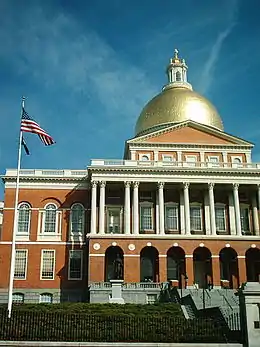
Officials elected statewide
- Massachusetts Statewide Constitutional Officers
.jpg.webp) Governor Charlie Baker (R)
Governor Charlie Baker (R).jpg.webp)
.jpg.webp) Attorney General Maura Healey (D)
Attorney General Maura Healey (D)
.jpg.webp) State Auditor Suzanne M. Bump (D)
State Auditor Suzanne M. Bump (D)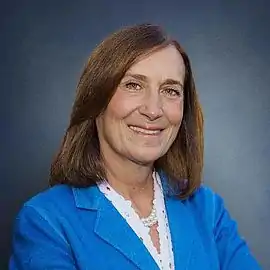
Governor's Council
The Governor's Council consists of eight elected councilors elected from districts every two years, as well as the lieutenant governor. The council provides for advice and consent for judicial appointments, appointment of certain public officials including notaries public and justices of the peace, pardons and commutations, and certain payments from the state treasury.[3] The governor is the nonvoting president of the council, but is chaired by the Lieutenant Governor in their absence.
| District | Councilor | Party | |
|---|---|---|---|
| Statewide (Lt. Governor) | Karyn Polito | Republican | |
| District 1 | Joseph Ferreira | Democrat | |
| District 2 | Robert L. Jubinville | Democrat | |
| District 3 | Marilyn M. Petitto Devaney | Democrat | |
| District 4 | Christopher A. Iannella | Democrat | |
| District 5 | Eileen R. Duff | Democrat | |
| District 6 | Terrance W. Kennedy | Democrat | |
| District 7 | Vacant | ||
| District 8 | Mary E. Hurley | Democrat |
- District attorneys and Sheriffs - Independently elected by district
Some executive agencies are tasked by the legislature with formulating regulations by following a prescribed procedure. Most of these are collected in the Code of Massachusetts Regulations.
Cabinet and Government Agencies
The governor has a cabinet of eleven secretaries. They supervise the state agencies, which are under the direct control of the governor.[4] Nine of the secretaries preside over the executive office of their respective areas.[5]
| Office | Secretary | Departments | Website |
|---|---|---|---|
| Executive Office of Administration and Finance | Michael J Heffernen | Appellate Tax Board | https://www.mass.gov/orgs/executive-office-for-administration-and-finance |
| Bureau of the State House | |||
| Civil Service Commission | |||
| Department of Revenue | |||
| Developmental Disabilities Council | |||
| Division of Administrative Law Appeals | |||
| Division of Capital Asset Management | |||
| State Library | |||
| Group Insurance Commission | |||
| Healthy Policy Commission | |||
| Health Resources Division | |||
| Office on Disability | |||
| Operational Services Division | |||
| Public Employee Retirement Administration Commission | |||
| Teacher's Retirement Board | |||
| Executive Office of Energy and Environmental Affairs | Kathleen A. Theohadires | Department of Agricultural Resources | https://www.mass.gov/orgs/executive-office-of-energy-and-environmental-affairs |
| Department of Conservation and Recreation | |||
| Department of Energy Resources | |||
| Department of Environmental Protection | |||
| Department of Fish and Game | |||
| Department of Public Utilities | |||
| State Reclamation Board | |||
| Executive Office of Health and Human Services | Marylou Sudders | Department of Children and Families | https://www.mass.gov/orgs/executive-office-of-health-and-human-services |
| Department of Developmental Services | |||
| Department of Elder Affairs | |||
| Department of Mental Health | |||
| Department of Public Health | |||
| Department of Transitional Assistance | |||
| Department of Veterans' Services | |||
| Department of Youth Services | |||
| Department of Public Health | |||
| Office of Refugees and Immigrants | |||
| Commission for the Blind | |||
| Commission for the Deaf and Hard of Hearing | |||
| Rehabilitation Commission | |||
| MassHealth | |||
| Soldiers Homes in Chelsea and Holyoke | |||
| Executive Office of Housing and Economic Development | Mike Kennealy | Consumers Affairs and Business Regulation | https://www.mass.gov/orgs/executive-office-of-housing-and-economic-development |
| Department of Business Development | |||
| Department of Housing and Community Development | |||
| Department of Telecommunications and Cable | |||
| Division of Banks | |||
| Division of Insurance | |||
| Division of Professional Licensure | |||
| Division of Standards | |||
| Massachusetts Marketing Partnership | |||
| Executive Office of Labor and Workforce Development | Rosalin Acosta | Department of Career Services | https://www.mass.gov/orgs/executive-office-of-labor-and-workforce-development |
| Department of Industrial Accidents | |||
| Department of Labor Relations | |||
| Department of Labor Standards | |||
| Department of Unemployment Assistance | |||
| Executive Office of Public Safety and Security | Thomas Turco | Department of Criminal Justice Information Systems | https://www.mass.gov/orgs/executive-office-of-public-safety-and-security |
| Department of Correction | |||
| Department of Fire Services | |||
| Department of Public Safety | |||
| Department of State Police | |||
| Emergency Management Agency | |||
| Merit Rating Board | |||
| Military Division | |||
| Municipal Police Training Committee | |||
| Office of the Chief Medical Examiner | |||
| Parole Board | |||
| Sex Offender Registry Board | |||
| Executive Office of Technology Services and Security | Curtis M. Wood | https://www.mass.gov/orgs/executive-office-of-technology-services-and-security | |
| Executive Office of Education | James Peyser | Department of Early Education and Care | https://www.mass.gov/orgs/executive-office-of-education |
| Department of Elementary and Secondary Education | |||
| Department of Higher Education | |||
| Public Colleges and Universities | |||
| Executive Office of Transportation and Public Works | Stephanie Pollack | https://www.mass.gov/orgs/massachusetts-department-of-transportation |
Legislature

The state legislature is formally known as the Massachusetts General Court, reflecting its colonial-era judicial duties. It has two houses: the 40-member Senate and the 160-member House of Representatives. Members of both houses have two-year terms. The Speaker of the House presides over the House of Representatives and controls the flow of legislation. The President is the presiding officer of the Senate.
The General Court is responsible for enacting the state's laws. A bill signed by the governor, or passed by two-thirds of both houses over his or her veto, becomes law. Its session laws are published in the Acts and Resolves of Massachusetts, which are codified as the General Laws of Massachusetts. On June 9, 2017, S&P Global Ratings downgraded Massachusetts' bond rating to AA (the third-highest tier) due to the legislature's inability to replenish the state's rainy day fund in the face of above-average economic growth.[6]
| Senate Leadership | House of Representatives Leadership | |||||||
|---|---|---|---|---|---|---|---|---|
| Senate Position | Senator | Party | Senate District | House Position | Representative | Party | House District | |
| President of the Senate | 
|
Democrat | 2nd Middlesex and Norfolk | Speaker of the House | 
|
Democrat | 19th Suffolk | |
| President pro tempore | 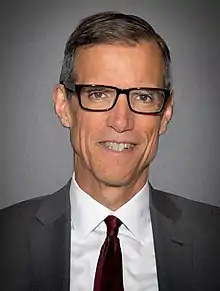
|
Democrat | 2nd Suffolk and Middlesex | Speaker pro tempore | 
|
Democrat | 5th Bristol | |
| Majority Leader | 
|
Democrat | 1st Middlesex and Norfolk | Majority Leader | 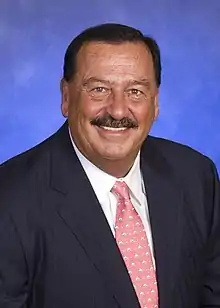
|
Democrat | 3rd Norfolk | |
| Minority Leader | 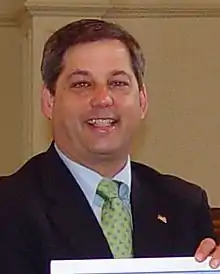
|
Republican | 1st Essex and Middlesex | Minority Leader | Bradley Jones Jr. | Republican | 20th Middlesex | |
Judiciary
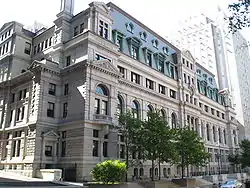
The judiciary is the branch of the government that interprets and applies state law, ensures equal justice under law, and provides a mechanism for dispute resolution. The Massachusetts court system consists of the Supreme Judicial Court, the Appeals Court, and seven trial-court departments.
Supreme Judicial Court
Judicial power is centered in the Supreme Judicial Court, which oversees the court system. In addition to its appellate functions, the Supreme Judicial Court is responsible for the governance of the judiciary and the bar, makes (or approves) rules for the operation of the courts and, on request, provides advisory opinions to the governor and legislature on legal issues. The Supreme Judicial Court also oversees affiliated judicial agencies, including the Board of Bar Overseers, the Board of Bar Examiners, the Clients' Security Board, the Massachusetts Mental Health Legal Advisors Committee, and Massachusetts Correctional Legal Services.
| Justice | Began active service | Appointed by | Reaches age 70 |
|---|---|---|---|
| Ralph Gants | 2009 (associate) 2014 (chief) | Deval Patrick (both) | 2024 |
| Barbara Lenk | 2011[7] | Deval Patrick | 2020 |
| Frank Gaziano | 2016 | Charlie Baker | 2034 |
| David A. Lowy | 2016 | Charlie Baker | 2031 |
| Kimberly S. Budd | 2016 | Charlie Baker | 2036 |
| Elspeth B. Cypher | 2017[8] | Charlie Baker | 2029 |
| Scott L. Kafker | 2017 | Charlie Baker | 2029 |
Appeals Court
The Appeals Court the state appellate court, which means that the justices review decisions made in the Trial Courts. The Appeals Court also has jurisdiction over appeals from final decisions of three State agencies: the Appellate Tax Board, the Industrial Accident Board and the Commonwealth Employment Relations Board. The Appeals Court consists of a chief justice and twenty-four associate justices.[9]
County Government
Only the southeastern third of the state has county governments; in western, central, and northeastern Massachusetts, traditional county-level government was eliminated during the late 1990s. District attorneys and sheriffs are elected by constituencies which mainly follow county boundaries, and are funded by the state budget.[10][11] Although most county governments have been abolished, all counties still have a sheriff's department which operates correctional facilities and service of process in the county.
Sheriffs
| County Sheriffs Office | Sheriff[12] | Party | Website |
|---|---|---|---|
| Barnstable | James M. Cummings | Republican | Link |
| Berkshire | Thomas Bowler | Democrat | Link |
| Bristol | Thomas Hodgson | Republican | Link |
| Dukes | Robert Ogden | Democrat | Link |
| Essex | Kevin Coppinger | Democrat | Link |
| Franklin | Christopher Donelan | Democrat | Link |
| Hampden | Nick Cocchi | Democrat | Link |
| Hampshire | Patrick Cahillane | Democrat | Link |
| Middlesex | Peter Koutoujian | Democrat | Link |
| Nantucket | James Perelman | Democrat | Link |
| Norfolk | Jerry McDermott | Republican | Link |
| Plymouth | Joseph McDonald, Jr. | Republican | Link |
| Suffolk | Steven Tompkins | Democrat | Link |
| Worcester | Lewis Evangelidis | Republican | Link |
District Attorney
District Attorneys are elected in 11 districts and serve as a public prosecutor representing the Commonwealth during criminal prosecutions. Most district attorneys are elected within the boundaries of a single county, and the district courts they operate in are within that county. The exception is Hampshire and Franklin Counties and the Town of Athol which make up the Northwestern District; and Barnstable, Dukes, and Nantucket Counties which make up the Cape and Islands District. Some districts that follow traditional county lines are officially known by a different name than the county, but they may also informally be called by the county name.
| District (Counties) | District Attorney[13] | Party | Website |
|---|---|---|---|
| Berkshire District | Andrea Harrington | Democrat | Link |
| Bristol District | Thomas Quinn, III | Democrat | Link |
| Cape and Islands District (Barnstable, Dukes, Nantucket) | Michael O'Keefe | Republican | Link |
| Eastern District (Essex) | Jonathan Blodget | Democrat | Link |
| Hampden District | Anthony Gulluni | Democrat | Link |
| Middle District (Worcester) | Joseph Early | Democrat | Link |
| Norfolk | Michael Morrissey | Democrat | Link |
| Northern (Middlesex) | Marian Ryan | Democrat | Link |
| Northwestern (Hampshire, Franklin) | David Sullivan | Democrat | Link |
| Plymouth | Timothy Cruz | Republican | Link |
| Suffolk | Rachael Rollins | Democrat | Link |
Registry of Deeds
All counties in Massachusetts have at least one registry of deeds, which is responsible for recording and holding copies of deeds, titles, and other land records within their district.[14] Each registry is run by an elected register of deeds, who serves for 6 year terms. Most counties have one registry, but some are divided into separate districts with their own registry. There are 21 registries.
| County | Registry | Register[15] | Party | Website |
|---|---|---|---|---|
| Barnstable | Barnstable | John F. Mead | Republican | |
| Berkshire | North Berkshire | Maria T. Ziemba | Democrat | |
| Middle Berkshire | Patsy Harris | Democrat | ||
| South Berkshire | Michelle L. Laramee-Jenney | Unenrolled | ||
| Bristol | North Bristol | Barry J. Amaral | Democrat | |
| Fall River | Bernard J. McDonald, III | Democrat | ||
| South Bristol | Frederick M. Kalisz, Jr. | Democrat | ||
| Dukes | Dukes | Paulo C. Deoliveiria | Democrat | |
| Essex | North Essex | M. Paul Iannuccillo | Democrat | |
| South Essex | John L. O'Brien, Jr. | Democrat | ||
| Franklin | Franklin | Scott A. Cote | Democrat | |
| Hampden | Hampden | Cheryl A. Coakley-Rivera | Democrat | |
| Hampshire | Hampshire | Mary K. Olberding | Democrat | |
| Middlesex | North Middlesex | Richard P. Howe, Jr. | Democrat | |
| South Middlesex | Maria C. Curatone | Democrat | ||
| Nantucket | Nantucket | Jennifer H. Ferreira | Unenrolled | |
| Norfolk | Norfolk | William P. O'Donnell | Democrat | |
| Plymouth | Plymouth | John R. Buckley, Jr. | Democrat | |
| Suffolk | Suffolk | Stephen J. Murphy | Democrat | |
| Worcester | North Worcester | Kathleen Reynolds Daigneault | Democrat | |
| South Worcester | Kathryn A. Toomey | Democrat |
Municipal government
Massachusetts shares with the five other New England states the New England town form of government. All land in Massachusetts is divided among cities and towns and there are no unincorporated areas, population centers, or townships. Massachusetts has four kinds of public-school districts: local schools, regional schools, vocational-technical schools, and charter schools.
Elections and politics
Massachusetts is known for its progressive politics, and is a stronghold of American Liberalism and the Democratic Party. In a 2018 Gallup poll Massachusetts was the state with the highest percentage of its population identifying as liberal and the lowest percentage identifying as conservative, at 35% and 21% respectively.[16] This and the high profile of well known politicians from Massachusetts such as the Kennedy family has led to the derogatory political phrase "Massachusetts Liberal".
Transparency
The state has an open-meeting law enforced by the attorney general, and a public-records law enforced by the Secretary of the Commonwealth.[17] A 2008 report by the Better Government Association and National Freedom of Information Coalition ranked Massachusetts 43rd out of the 50 US states in government transparency. It gave the state a grade of "F," based on the time, cost, and comprehensiveness of access to public records.[18] Access to government records and the actions of the Secretary in enforcing the law became an issue in the 2014 campaign for the office. Incumbent William Galvin cited his previous requests that the legislature revise the Public Records Law to facilitate access.[19] According to the governor, he is exempt from the Public Records Law.[17] A reform law was signed on June 3, 2016 and took effect on January 1, 2017, imposing stricter time limits and lower costs.[20]
See also
- Outline of Massachusetts
- Index of Massachusetts-related articles
- Politics of Massachusetts
- Law of Massachusetts
- Law enforcement in Massachusetts
- Judiciary of Massachusetts
- Courts of Massachusetts
- United States Congress
- United States congressional delegations from Massachusetts
- List of United States senators from Massachusetts
- Massachusetts's congressional districts
- List of United States Representatives from Massachusetts
- State governments of the United States (comparison)
References
- "Home - Boards and Commissions". appointments.state.ma.us.
- "Constitutionals & Independents". Mass.gov. Retrieved April 15, 2020.
- "Governor's Council". Mass.gov. Retrieved April 15, 2020.
- "State Government Organizational Chart - Commonwealth of Massachusetts". mass.gov.
- 6A MGL 2
- Miller, Joshua (June 9, 2017). "State bond rating downgraded in blow to Baker, Mass. politicians". The Boston Globe. Retrieved June 10, 2017.
- Levenson, Michael (May 4, 2011). "Lenk approved for SJC; first openly gay justice on state's highest court". Boston Globe. Retrieved May 4, 2011.
- "Justice Margot Botsford retires from SJC – The Boston Globe". Retrieved July 7, 2017.
- "Appeals Court". Mass.gov. Retrieved April 20, 2020.
- "FY2009 Budget - District Attorneys General Appropriations Act". mass.gov.
- "FY2009 Budget - Sheriffs General Appropriations Act". mass.gov.
- "PD43+ » Search Elections". PD43+. Retrieved April 18, 2020.
- "PD43+ » Search Elections". PD43+. Retrieved April 18, 2020.
- www.masslandrecords.com http://www.masslandrecords.com/. Retrieved April 15, 2020. Missing or empty
|title=(help) - "PD43+ » Search Elections". PD43+. Retrieved April 15, 2020.
- Inc, Gallup (February 22, 2019). "Conservatives Greatly Outnumber Liberals in 19 U.S. States". Gallup.com. Retrieved April 24, 2020.
- "FOREWORD". rcfp.org.
- "States Failing FOI Responsiveness". nfoic.org.
- "Secretary of State Galvin faces criticism for keeping government secrets - Metro - The Boston Globe". BostonGlobe.com.
- "Gov. Baker Signs Law Overhauling State's Public Records System". www.wbur.org.
Further reading
- Organizational structure of the Government
- Center for Public Integrity; Global Integrity; Public Radio International (2011). "Massachusetts". State Integrity Investigation: Keeping Government Honest. USA.
External links
| Wikimedia Commons has media related to Government of Massachusetts. |

